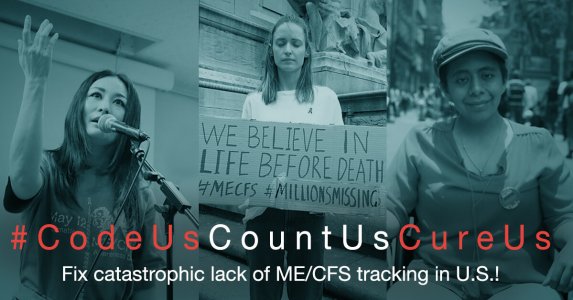In August, we shared with you that we and six other ME/CFS organizations had submitted a proposal to the National Center of Health Statistics (NCHS) to fix the coding of ME/CFS in the US International Classification of Diseases (ICD-10-CM). Today, we are writing with an update on that proposal and asking that you sign the #CodeUsCountUsCureUs petition in support of our proposal.
At present , because of ICD-10-CM coding of ME/CFS in the US, it is impossible to track the mortality and morbidity of 1 to 2.5 million Americans with ME/CFS, or to identify ME/CFS cases using ICD codes in electronic health records. This is also a major barrier to any research in this disease, and an urgent issue, especially with the potential tsunami of new ME/CFS cases following COVID-19 infections.
Previous proposals to fix this in 2011, 2012, and 2018 were rejected by NCHS because of the lack of stakeholder consensus on how to resolve the problem. To move this forward, the 2021 proposal submitted by the organizations focused on the most basic changes – addition of the term ME/CFS and allowing for non-viral triggers. NCHS has since added additional coding changes, some of which were already rejected in those earlier proposals because of the lack of consensus. Further details on the organizations’ proposal and NCHS’ coding recommendations are below.
We appreciate that you may not agree with some or all of the coding changes added by NCHS. But we ask that you support the specific changes we requested, even if you reject the other changes proposed by NCHS. Please sign the petition in support of our proposal to fix the ICD coding of ME/CFS. We must find a way to move forward so that we can count and track cases of ME/CFS.
NCHS Upcoming Meeting
NCHS will discuss this topic on September 15, 2021 at 2:15 EST at its ICD-10-CM Coordination and Maintenance Committee meeting. The meeting packet can be found here and includes the proposal summary and NCHS’ recommended coding changes on page 169. The meeting packet also includes directions on how to join the meeting on page 7. Limited time will be provided in the meeting for questions and comments. If instead of signing the petition, you wish to send a personal comment, you can do so until November 15, 2021. Additional information on how to submit personal comments can be found here.
For more information, see these FAQs.
More Details
ME/CFS cases can’t be identified in US mortality and morbidity tracking or in US research using electronic health records. This is because the term ME/CFS does not exist in the US ICD-10-CM and the term CFS, the term US doctors most often use, has the same code as the symptom of “chronic fatigue, unspecified.”
Proposals were submitted in 2011, 2012, and 2018 to fix this problem but were rejected by the National Center of Health Statistics (NCHS) because of a lack of stakeholder consensus on what to do, particularly regarding the term CFS. There is no single solution to this problem that everyone will agree to. But the current inability to track ME/CFS cases is not tenable.
To avoid having a fourth proposal rejected, this year’s proposal to NCHS asked for the most basic changes possible – to add the term ME/CFS and to expand the category to allow non-viral causes. This proposal was submitted by the International Association for Chronic Fatigue Syndrome/Myalgic Encephalomyelitis, #MEAction, Open Medicine Foundation, Solve M.E., Massachusetts ME/CFS & FM Association, the Minnesota ME/CFS Alliance, and Pandora Org. Our goal is to finally have a mechanism to track cases of ME/CFS. Our proposal included the following recommendations:
- Expand the lead term for G93.3, post-viral fatigue syndrome, to accommodate non-viral triggers
- Remove “benign” from the term “myalgic encephalomyelitis”
- Provide separate subcodes (G93.3n) for post-viral fatigue syndrome and myalgic encephalomyelitis since ME is not always postviral.
- Per ICD convention, we also included a subcode for “other” conditions outside these.
- Add the terms “myalgic encephalomyelitis/chronic fatigue syndrome” and “ME/CFS” as inclusions (essentially a synonym) of myalgic encephalomyelitis.
- This term has been adopted by US government agencies and clinical guidance providers
When NCHS receives proposals, it sometimes recommends additional or different coding changes. This year, NCHS has made the following additional coding changes:
- Establish “myalgic encephalomyelitis/chronic fatigue syndrome” as the lead term for the G93.3n subcode. Include the terms “myalgic encephalomyelitis,” “chronic fatigue syndrome,” and “ME/CFS” as inclusions of that lead term. All these terms will use the same subcode.
- The World Health Organization and other countries classify CFS in the neurological chapter.
- Add the term “systemic exertion intolerance disease” to the index file and give it the subcode used for “myalgic encephalomyelitis/chronic fatigue syndrome.” The index file is a secondary index of diseases.
- In the 2018 meeting, NCHS said this addition was required if US doctors diagnose SEID.
- Revise the terms Akureyri’s disease, Iceland disease, and neuromyasthenia in the index file to point to a new subcode, “Other post infection and related fatigue syndromes.”
- These are historical names for what is now referred to as ME
A number of NCHS’ additional changes were previously rejected because of lack of consensus among stakeholders, including objections from patients and caregivers, on whether and how the coding should be fixed. As a result, NCHS never addressed the issues with the coding of ME/CFS. The disease remains coded as the symptom of “chronic fatigue, unspecified” in the US and invisible in tracking systems and in research using electronic health records.
Please sign the petition in support of our proposal to fix the ICD coding of ME/CFS.





